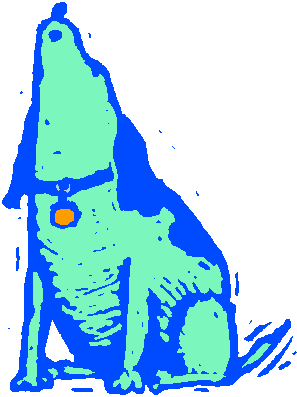![]()
snips
"The Surplus"... 
spay/neuter
/ tips / greyhounds
/ news / quotes
/ stories / books
/ links / happily
ever afters / mission / get
in touch / home
/
The Pet* Surplus by Susan Seidman
Putting
the Onus on Pet* Owners
By Joan Lowell Smith
Nobody wants to dwell on gruesome statistics about companion animals needlessly put to death everyday for lack of homes. When we hear that literally millions meet that grim fate, we tend to wonder what we can do about it.
Susan Seidman, author of "The Pet Surplus," subtitled "What every dog and cat owner can do to help reduce it" (Xlibris $16), offers some concrete suggestions -- along with a perspective on the causes of the "pet surplus."
"I addressed my book to pet owners," said the author from the Long Island home she shares with three cats. "I've had people ask me if this is 'another book about the importance of spaying and neutering.' That's an easy one to answer. Why would I spend 3 1/2 years and write 75,000 words just to say 'get your pet fixed'?
"That would be awfully boring," she said with a laugh.
With 40 years as a journalist writing about pets -- cats especially -- for major pet magazines such as Cat Fancy, Seidman decided to assemble her accumulated knowledge into her first book, which is packed with valuable information. "I wanted to write something useful and worthwhile, to cover so much that hadn't been put together before," she said.
Even though the numbers of pets euthanized is staggering, all is not bleak in her estimation. The figures have dropped considerably because spaying and neutering has finally become more routine, but she says they are still higher than they should be.
Seidman attributes this in large part to impulse buyers who help to create shelter overpopulation and keep euthanasia statistics high. "Today, everyone is in a hurry. People want instant solutions," she said. "It takes time and extra patience to commit to an animal. They don't want to take the time to train an animal. Next thing you know, they've run out of patience and get rid of it." If the animal has behavior problems or is elderly, the pet's chances of a permanent home are slim.
A major contribution to pet overpopulation is the notion that breeding "just one litter" is good for the dog or cat, when there is no medical evidence to corroborate that opinion. Another misnomer she refutes is that when a dog or cat is fixed, it will become an inactive blob of blubber -- also not true.
A
Maverick Approach
Seidman
boldly writes: "So many caring owners have unthinkingly encouraged
overpopulation by buying a breeder's animal instead of adopting a no-less-desirable
orphan ... The overriding point is that this choice denies a home to an
animal in urgent need of one. Once the vacancy in the household is filled
by a pet deliberately bred to be sold, the door automatically slams on
a pet who couldn't survive unless adopted. Somewhere along the line, a
dog was doomed to die."
One of her neighbors disputed that concept when the woman's purebred Labrador died. Early in her book, the author admits she had no impact on the woman, who quickly purchased another Lab from a breeder. However, in our conversation, Seidman was relieved to announce: "I'm delighted that she just adopted another Lab from a shelter." This information was not included in the book because it occurred after the book was released.
Before our conversation, Seidman had just completed an interview for a Los Angeles radio station during which the host argued vehemently against her theory on purebreds. "He said people have a 'right' to buy a purebred from a breeder, which, of course, they do," she said. "That wasn't my point. Of course, people have a right. They also have an obligation to have the dog spayed or neutered."
Room
for Pets
Seidman
addresses a common problem I hear about from readers with increasing frequency:
rental properties prohibiting pets. Hearts are broken and pets relinquished
when owners run out of options because so many rental properties won't
accept pets in New Jersey. "Probably the single greatest obstacle
to ownership of pets is the restrictions on them in rental housing, as
well as some condos and co-ops," she writes. "Humane groups
are pushing hard, with limited success so far."
She'd like to see "no pets" clauses in leases abolished "on the grounds that such blanket discrimination is just as unfair as a ban on children or minorities. Federal legislation has already opened up housing that receives public funds and lobbyists are working to liberalize policies in privately owned buildings." (Seidman knows the workings of government as a former editor of the Foreign Policy Association publication.)
Other
Thoughts
Other
topics that Seidman covers in the book include the importance of pet training,
a key ingredient in long-term commitment to pets, and the feral cat explosion.
She winds up urging all pet owners to plan now for future care of pets,
which could outlive you, regardless of your age or theirs -- good advice
in view of 9/11.
She finds fault with the lack of unanimity among various professionals -- shelter officials, vets, animal rights activists, breeders of show quality purebreds -- all of whom promote the interests of pets, but often in conflicting ways. "Sometimes, their competing priorities erupt in furious controversy," she writes and cites examples of ways that professionals become sidetracked with interpersonal rivalries rather than remaining focused on the welfare of animals.
The
American Humane Association praised "The Pet Surplus": "If
books like this could be put into the right hands, more strides could
be made to make the world a better place for our domestic companions."
SOURCE: http://www.nj.com/living/ledger/index.ssf?/base/living-0/102905702181000.xml
| * snips endorses and encourages the use of the terms "companion animal" and "guardian" in place of the terms "pet" and "owner." See why. |
